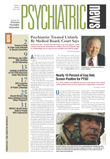How reliable are psychiatric diagnoses is the question that was raised 30 years ago by David Rosenhan's renowned pseudo-patient study and raised again by Lauren Slater's account of her own replication of that study in her book Opening Skinner's Box: Great Psychological Experiments of the 20th Century.
But psychiatrist Robert Spitzer, M.D., and other psychiatrists and mental health professionals are skeptical of Slater's account. To test the validity of Slater's account, they presented a sample of emergency room psychiatrists with a vignette description of a hypothetical case that matched Slater's account of how she presented herself at nine emergency rooms.
An e-mail was sent to 431 members of the American Association of Emergency Psychiatry with a note from its president urging them to participate in a study of psychiatric diagnosis and evaluation conducted by unnamed researchers at the New York State Psychiatric Institute. The note said that to reveal the purpose of the study would potentially bias the answers, but that the purpose would be posted on the association's Web site when the study was completed. A link to the study's Web site and questionnaire was provided. All responses were anonymous.
Study participants were asked to consider the following case:
A married woman in her 30s comes to the emergency room complaining of hearing a voice outside her head saying the word `thud.' She seems surprised when another psychiatrist tells her that she looks `quite depressed,' and she denies all symptoms of depression. She appears not to have brushed her teeth or showered and wears a T-shirt that says, `I Hate My Generation.' She says her appetite is good, her sleep is normal, and her work proceeds as usual. She says that she is able to take care of her child.
Participants were then asked the following questions: What diagnosis(es) would you write on the chart? Would you hospitalize the patient? If no, would you refer the patient to an outpatient clinic? Would you prescribe medication? If yes, which medication(s)? Reason for medication(s). Is there anything else you would do or say?
Of 74 respondents, 56 avoided a specific DSM-IVdiagnosis and instead diagnosed either psychosis not otherwise specified (NOS) (39) or indicated that a diagnosis could not be made (17); four diagnosed psychotic depression; four made another diagnosis but indicated that the psychotic depression needed to be ruled out. The remaining 10 made other specific diagnoses. Sixty-three said they would refer to an outpatient clinic, and those who said they would hospitalize the woman said it was for the purpose of further evaluation to make a diagnosis. Twenty-five indicated they would prescribe an antipsychotic; no one said they would prescribe an antidepressant.
